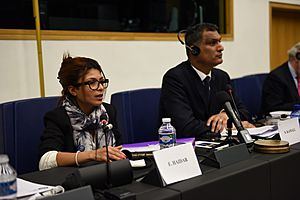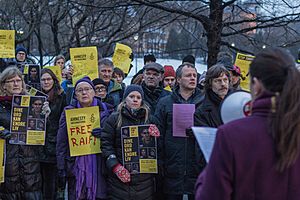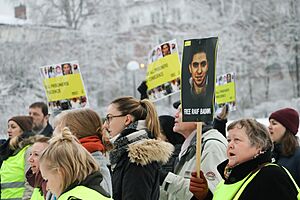Raif Badawi facts for kids
Quick facts for kids
Raif Badawi
|
|
|---|---|
| رائف بن محمد بدوي | |
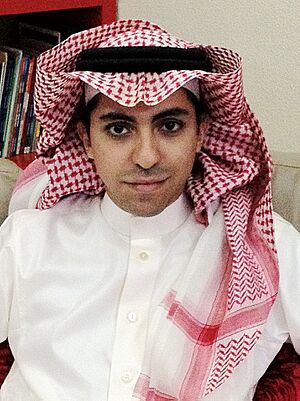
Badawi in 2012
|
|
| Born | 13 January 1984 Khobar, Saudi Arabia
|
| Nationality | Saudi Arabian |
| Occupation | Author, writer and activist |
| Known for | Blogging, expressing opinions |
| Criminal charge(s) | Expressing ideas about Islam |
| Criminal penalty | 10 years in prison; 1000 lashes; fine of SAR 1 million |
| Criminal status | Released 11 March 2022; banned from travel outside country until 2032 |
| Spouse(s) |
Ensaf Haidar
(m. 2002) |
| Children | 3 |
| Relatives | Samar Badawi (sister) |
Raif bin Muhammad Badawi (Arabic: رائف بن محمد بدوي) is a Saudi writer and activist. He created a website called Free Saudi Liberals.
In 2012, Raif Badawi was arrested for "insulting Islam through electronic channels." He was later charged with other things, including expressing ideas about religion. In 2013, he was found guilty and sentenced to seven years in prison and 600 lashes. In 2014, his punishment was increased to 10 years in prison, 1,000 lashes, and a large fine.
The first 50 lashes were given on 9 January 2015. The rest of the physical punishment was put off many times because of his poor health. Raif Badawi has high blood pressure, and his health got worse after the first lashing.
His wife, Ensaf Haidar, moved to Canada because her life was in danger in Saudi Arabia. She has spoken out many times about her husband's situation. The Raoul Wallenberg Centre for Human Rights in Canada has helped Raif Badawi with legal advice and public campaigns.
Raif Badawi was held in Dhahban Central Prison. On 11 March 2022, after 10 years, his family announced he was released from prison. However, he is not allowed to leave Saudi Arabia until 2032.
Contents
Early Life and Ideas
Raif Badawi was born on 13 January 1984, in Khobar, Saudi Arabia. His mother was Lebanese Christian, and his father was Saudi Muslim. His grandmother taught him that Saudi society used to be more open.
Raif's mother passed away when he was young. He was raised by his father and grandmother, who did not have much money. When he was thirteen, his father reported him for not obeying, which was a crime in Saudi Arabia. He spent six months in a youth detention center. There, he faced bullying and strict religious teachings, which deeply affected him.
Free Saudi Liberals Website
How the Website Started
Raif Badawi started an online discussion site called "Saudi Liberal Network" on 13 August 2006. He was inspired by books from Arab writers who wanted to see the world beyond only religious views. He also learned from "Diwaniya" meetings. These were traditional evening gatherings where journalists, poets, and thinkers discussed ideas for a more open and accepting society in Saudi Arabia.
Raif often went to these meetings. He hoped for a society where people had more freedom and less control from strict religious rules. He wanted Saudi citizens to know their rights and responsibilities.
Sharing Ideas and Challenges
Badawi's website quickly became well-known. It was a place where Saudis could talk openly about liberal ideas in a very conservative country. He believed that freedom was worth the risk. He said, "To me, liberalism means simply to live and let live."
On his website, Badawi spoke out against the actions of the Mutawwa (the "religious police"). He did not directly criticize the Saudi Government because he saw himself as a patriot. Instead, his posts questioned rules like why women needed a male guardian or why it was hard for women to find jobs. Badawi also wondered why all Saudis had to believe in Islam. Even though he was Muslim, he felt people should be free to choose their own faith.
By late 2007, Badawi's website had at least 2,000 members. They discussed how Saudi Arabia was governed. The religious police did not like Badawi's writings. They arrested him in late 2007 and questioned him for many hours. He was released without charges. A few days later, the religious police searched his home but found nothing. They continued to question Badawi often, which worried his wife, Ensaf Haidar.
Legal Challenges and Punishments
Arrest and First Sentence
Raif Badawi was first held in 2008 for expressing ideas about religion, but he was released after one day. He was stopped from leaving Saudi Arabia, and his and his wife's bank accounts were frozen in 2009. His wife's family later tried to force them to divorce because of his ideas.
On 17 June 2012, he was arrested for "insulting Islam through electronic channels." In December, he was also accused of expressing ideas about religion, which could lead to a very serious punishment. However, Badawi confirmed in court that he was Muslim. He also said that people should have the right to choose their faith. Human Rights Watch said Badawi's website had criticized "senior religious figures."
After his 2012 arrest, Amnesty International called Badawi a "prisoner of conscience." This means he was held only for peacefully using his right to speak freely. They said it was wrong to seek such a severe punishment for an activist whose only "crime" was allowing online discussions.
On 30 July 2013, Saudi media reported that Badawi was sentenced to seven years in prison and 600 lashes. This was for creating an Internet forum that "violates Islamic values and spreads liberal thought." The court also ordered his website to be shut down.
Punishment Increased
On 26 December 2013, Badawi's wife, Ensaf Haidar, said a judge wanted to send her husband's case to a higher court for the religious ideas charge. On 7 May 2014, Badawi’s punishment was increased to 1,000 lashes, 10 years in prison, and a fine of ر.س 1,000,000 (about US$267,000 US dollars at the time). This was for "insulting Islam." In mid-January 2015, his case went to the Saudi Supreme Court for review. On 1 March 2015, Badawi's wife told reporters that judges wanted to retry him for expressing religious ideas, which could lead to the most severe punishment.
Ensaf Haidar Seeks Safety in Canada
After a court hearing, Badawi's wife, Ensaf Haidar, started getting threats. She moved to Sherbrooke in Quebec, Canada, with their three children. On 27 January 2015, Canadian politician Marc Garneau said he and Irwin Cotler would help Badawi's wife. Speaking at the UN Human Rights Council, human rights activist Kacem El Ghazzali criticized Saudi Arabia for Badawi's punishment.
Badawi's Lawyer Also Imprisoned
Badawi's lawyer, Waleed Abulkhair, was also put in prison. He had started a human rights organization in Saudi Arabia. He was charged with "setting up an unlicensed organization" and "breaking loyalty with the ruler." His requests to get a license for his organization were denied. On 7 July 2014, Abulkhair was sentenced to 15 years in prison, followed by a 15-year ban on travel.
Abulkhair told the BBC that Badawi had confirmed in court that he was a Muslim. He also said to the judge, "Everyone has a choice to believe or not believe."
Public Physical Punishment
On 9 January 2015, Badawi received 50 lashes in front of many people near a mosque in Jeddah. This was the first part of 1,000 lashes he was sentenced to receive over twenty weeks. Many groups, like Amnesty International, spoke out against this. They said it was a cruel act and against international law. Prince Zeid bin Ra'ad of Jordan asked the King of Saudi Arabia to stop the punishment.
Raif Badawi’s wife, Ensaf Haidar, said she felt "indescribable sadness and pain" when she heard about the lashing. She hoped that governments around the world would pressure Saudi authorities to stop the punishment. Further lashings were put off because Badawi's injuries had not healed, and he was not well. He has diabetes and a slim build. He was supposed to receive 50 lashes every Friday for 20 weeks.
Global Response
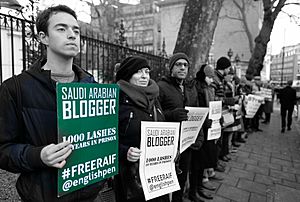
There was a worldwide effort to free Badawi. This included protests, petitions, letters, and social media campaigns. The hashtag "JeSuisRaif" became popular in January 2015. Many people questioned why doctors would check Badawi before such physical punishment. The UK Foreign Secretary Philip Hammond raised the issue with the Saudi ambassador.
Eighteen Nobel winners signed a letter asking Saudi academics to speak out against Badawi's punishment. As of 22 January 2015, Amnesty International's petition to free Badawi had almost 800,000 signatures. Badawi's wife told the BBC that her family was constantly worried. She asked Canadian Prime Minister Stephen Harper to talk to Saudi authorities.
After the second set of lashes was postponed for the third time on 30 January 2015, people hoped Badawi might be released. The National Assembly of Québec passed a motion against Badawi's punishment. By the end of February, the next lashing had been postponed seven times.
Sixty-seven members of the United States Congress sent a letter to the King of Saudi Arabia on 3 March 2015. They asked for the release of all prisoners of conscience, including Raif Badawi and Waleed Abulkhair. Archbishop Desmond Tutu also sent a letter to King Salman supporting Badawi.
In early March 2015, Ensaf Haidar asked Sigmar Gabriel, Germany’s Vice-Chancellor, to help free Badawi during his visit to Saudi Arabia. Gabriel said he would discuss Badawi's case with the royal family. He told reporters that the harshness of the punishment was "unimaginable" for them. The Saudi Arabian government responded by saying it would not accept interference in its internal affairs.
Sweden's foreign minister, Margot Wallström, also spoke publicly about Badawi's case. In March 2015, Saudi Arabia stopped Wallström from speaking at an Arab League meeting. Sweden then ended its long-standing arms agreement with Saudi Arabia.
On 6 August 2018, Saudi Arabia expelled the Canadian ambassador and stopped all trade with Ottawa. This happened after Canada's Minister of Foreign Affairs Chrystia Freeland expressed concern about the arrest of Samar Badawi, Raif Badawi's sister, and asked for both their releases. In July 2019, U.S. Vice President Mike Pence urged Saudi Arabia to free Badawi.
Continued Concerns
The Saudi Supreme Court upheld the sentence, and there were worries Badawi could be lashed again in June 2015. The punishment was delayed again. Badawi's wife believed he was in poor physical and mental health.
In October 2016, there were fears that the physical punishment could restart. Ensaf Haidar said she was "shocked" and "scared." She hoped Saudi Arabia would not carry out the sentence. She also hoped they would take away his citizenship and send him to Canada to be with his family. Badawi reportedly refused to eat at least twice.
Release from Prison
On 11 March 2022, Raif Badawi's family announced that he was released from prison. However, he is still not allowed to leave Saudi Arabia. A fundraising campaign was started to help his family pay the fines he was given.
Personal Life
Raif Badawi met his wife, Ensaf Haidar, by accident when he dialed her number by mistake. They started talking in secret. Raif Badawi married Ensaf Haidar in 2002 in Saudi Arabia. They have three children: Najwa (born 2003), Doudi "Tirad" (born 2004), and Miriyam (born 2007).
Badawi and Haidar lived in Jizan with their children. Later, Haidar's brothers tried to make her divorce Badawi, so they moved to Jeddah, a more open city. Badawi used to run a women's education system but sold it after he started expressing his ideas.
Badawi's wife and children were given political asylum by the Government of Canada in 2013, where they live now. Badawi is Muslim. His wife has said he is a "good Muslim" and believes in a "live and let live" way of thinking.
Awards and Recognition
Awards
- Günter Wallraff Prize for journalism 2019
- International Laïcité Award 2018 (shared with Ensaf Haidar)
- Daniel Pearl Award 2018
- Montreal Press Club Freedom Award 2018
- Deschner Prize 2016 (shared with Ensaf Haidar)
- Salam Prize for Peace (Frankfurt) 2016
- Liberal International Prize for Freedom 2016
- Prix Voltaire 2016
- Sakharov Prize 2015, for defending freedom of thought and human rights
- Swiss Freethinker Prize 2015 (shared with Ensaf Haidar and Waleed Abulkhair)
- PEN Pinter Prize 2015 (shared with James Fenton)
- Strasbourg Award Medal of Honor 2015
- Franco-German Journalism Prize 2015
- Thomas Dehler medal 2015
- Press Freedom Prize 2015, from Reporters Without Borders, Sweden
- Freedom of Speech Award 2015, from Deutsche Welle
- Courage Award 2015, from the Geneva Summit for Human Rights and Democracy
- Aikenhead Award 2015
- One Humanity Award 2014
- Netizen Prize 2014, from Reporters without Borders
Special Recognitions
- Honorary membership 2019, by Cambridge Union (shared with Ensaf Haidar)
- Honorary Doctorate, from Université de Sherbrooke
- Honorary citizenship Montreal
- Université de Sherbrooke named a master's program in law and international politics after him (2017–18)
- One of the Leading Global Thinkers of 2015, By Foreign Policy
- One of the Boss List 2015, By AskMen
- Honorary citizenship, Sherbrooke, Quebec
- Honorary Title for Freedom of Expression, from Brussels University Alliance (VUB and ULB), 2015
- Honorary membership, PEN Canada
- Honorary membership, PEN Denmark
- Honorary membership, PEN Germany
- Man of the Year 2015, By The Fifth Column
- Honorary membership 2017, by Fédération professionnelle des journalistes du Québec
Nominations
- Nobel Peace Prize, 2015
- Nobel Peace Prize, 2016
- 2014 Freedom Award, from Spain's Individual Freedom Party (P-LIB)
- Freedom to Publish Prize 2014, from the International Publishers Association
Books
- Badawi, Raif; Schreiber, Constantin, editor; Hetzl, Sandra, translator, 1000 Peitschenhiebe : weil ich sage, was ich denke [1000 Lashes: Because I Say What I Think]. Ullstein, Berlin 2015, ISBN: 978-3-550-08120-0 (German)
- Badawi, Raif; Schreiber, Constantin, editor; Ahmad Danny Ramadan, translator, 1000 Lashes: Because I Say What I Think. Vancouver 2015, ISBN: 978-1771642095 (Canada)
See also
 In Spanish: Raif Badawi para niños
In Spanish: Raif Badawi para niños
- Human rights in Saudi Arabia
- Legal system of Saudi Arabia
- Religion in Saudi Arabia § Irreligion, Irreligion in Saudi Arabia
 | Kyle Baker |
 | Joseph Yoakum |
 | Laura Wheeler Waring |
 | Henry Ossawa Tanner |


